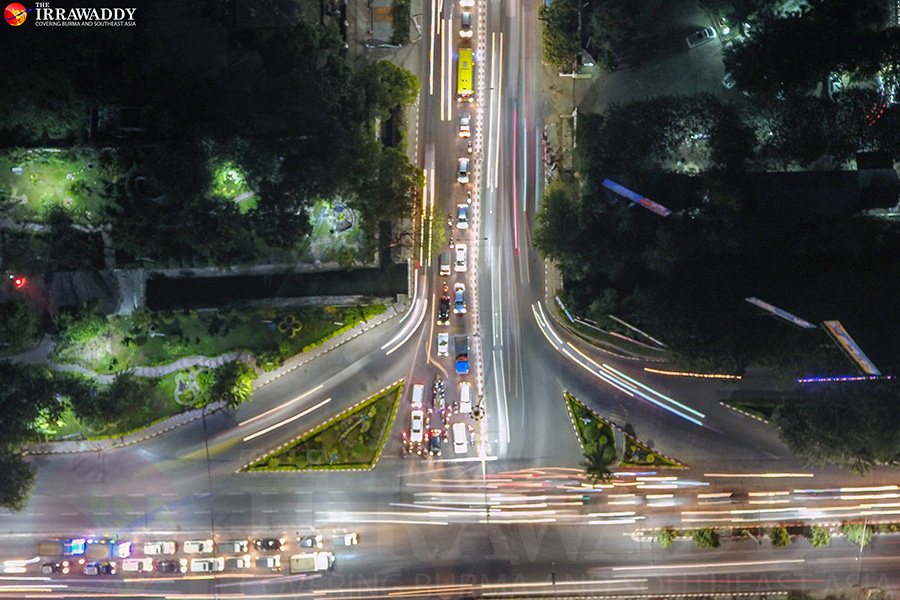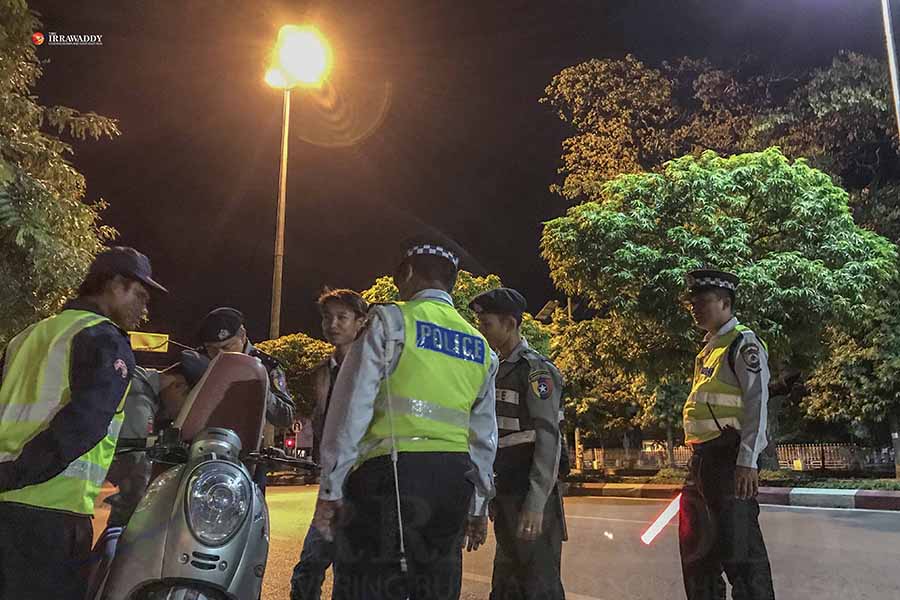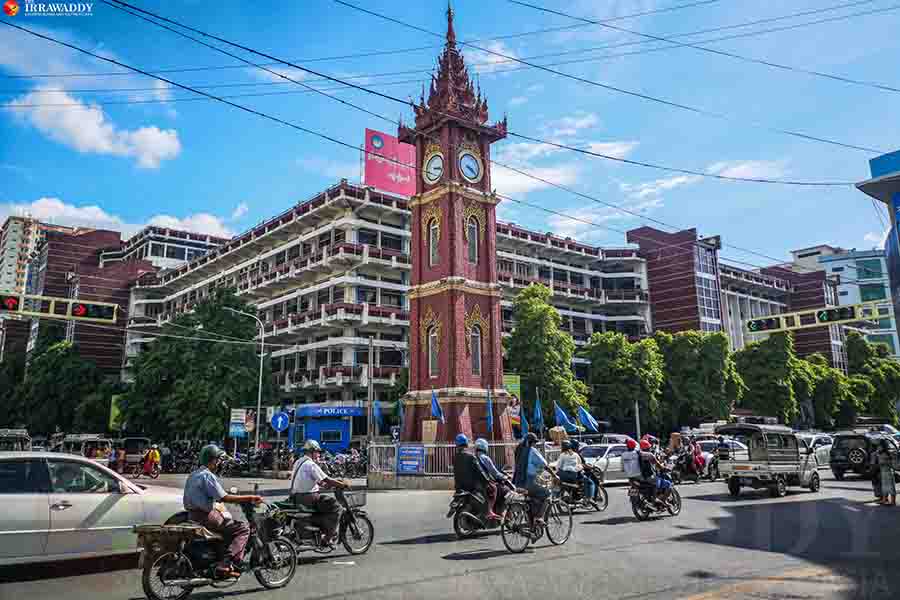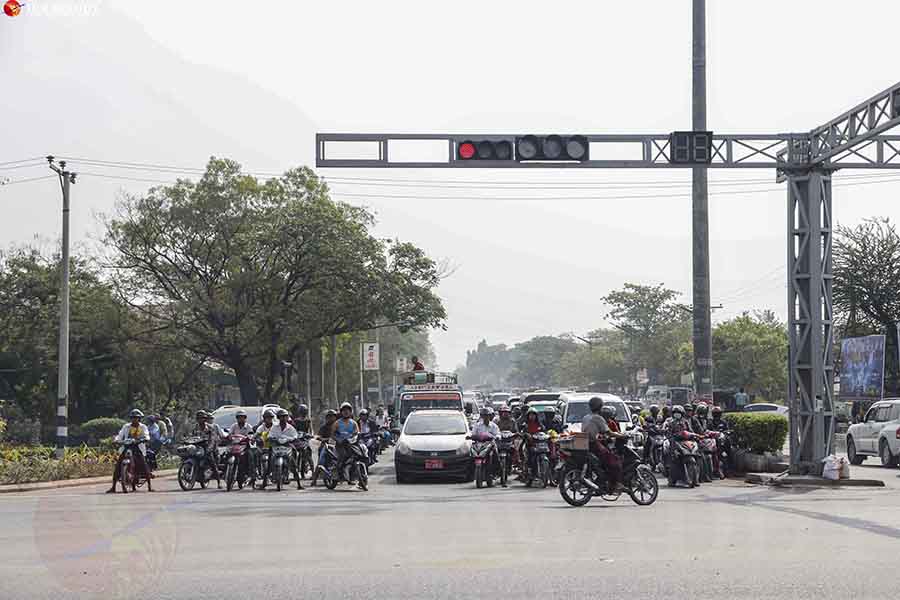YANGON—As part of its high-tech makeover to become a “smart city” with a view to enhancing the rule of law and security, Myanmar’s second largest city Mandalay is ready to embrace Huawei, prompting questions about whether upper Myanmar’s business hub will become prone to data theft and state-sponsored spying—both of which the Chinese telecom giant has been internationally accused of.
As a part of the smart city scheme, a Safe City project designed in cooperation with Huawei was announced by the Mandalay Region Chief Minister U Zaw Myint Maung in March at the Mandalay International Trade Fair and Business Forum 2019, highlighting the project’s aim to guarantee “rule of law and security” with a view to attracting more investors to the city.

From interviews conducted by The Irrawaddy with the Mandalay government and the deputy general manager of Huawei Myanmar, it was found that for an estimated 1.9 billion kyats (US$1.24 million), Huawei will provide what they call a “safe city solution” which includes hardware like CCTV recording equipment, related software, installation, commissioning and technical support to the Mandalay government.
The Mandalay government has announced plans for the installation of Huawei CCTV monitoring systems equipped with artificial intelligence (AI) and facial-recognition technology, as well as an alarm system which alerts the nearest police station in the case of a crime, saying it is expected to come into operation in the city within six months of the contract being signed.
The contract between the Mandalay government and Huawei hasn’t been signed yet. However, Mandalay Regional Minister for Electricity, Industry and Construction U Zarni Aung told The Irrawaddy last month that a lot of progress has been made toward signing the contract and they expect it to be done soon. The Irrawaddy has separately learnt that the project is now being reviewed by the Union government. At the moment, Huawei and the Mandalay Police Force are conducting a survey of potential CCTV locations, according to U Ye Myat Thu, Mandalay’s smart city officer and member of Mandalay City Development Committee (MCDC).
According to the regional minister, among the city’s six townships, CCTV will be installed first at every intersection in three crime-ridden townships—Maha Aung Myay, Chan Mya Thazi and Pyi Gyi Tagun. These townships are large and have relatively high crime rates, according to initial survey results. The system will later be expanded to other parts of the city including toll gates.
During the economic forum held in the city in March, the Mandalay Chief Minister U Zaw Myint Maung told the audience the city will use Huawei’s technology to implement the Safe City project.
“Huawei’s technology is high [quality]. That’s why our government decided to make a contract with Huawei,” he said.
The Mandalay government has said Huawei’s Safe City solution will help the city reduce crime rates, increase police efficiency and provide a safer public environment. Last year, 10 murder cases put the city among the country’s highest crime rates. The city of more than 1 million people was also frequently rocked by cases of robbery, theft and a surge in drug use and trafficking.
However, concern surrounding the company’s controversial background has risen among the public, particularly for the allegations it faces of producing spying tools for the Chinese government. Huawei has been accused of managing and storing sensitive information collected from foreign governments and private citizens.

Controversies surrounding Huawei
With revenues of nearly $107 billion last year, Huawei is the world’s largest supplier of telecommunications network equipment and the second-biggest producer of smartphones, employing around 180,000 people in more than 170 countries around the world.
Selling more smartphones than Apple, Huawei has rapidly risen over two decades through the ranks of leading telecommunications and information technology equipment companies, assisted at times by the affordability of its products. The company is working with telecom carriers worldwide and develop network infrastructures with EU countries including the UK which has plans for Huawei to build key parts of the country’s new 5G network.
Despite its popularity, the company has come under fire as the U.S. warned its intelligence partners—the UK, Canada, New Zealand and Australia— that awarding contracts to Huawei would be tantamount to allowing Chinese state-sponsored espionage. Following the warning, Australia last year banned equipment suppliers “likely to be subject to extrajudicial directions from a foreign government.” Meanwhile, the UK, Germany and Canada are reviewing whether Huawei’s products pose a security threat.
The spying accusations surfaced following revelations that Huawei’s leadership could be linked to the Chinese military, the leading Chinese Communist Party (CCP) and to China’s state intelligence and security agency. The founding CEO Ren Zhengfei has reportedly served as a technologist in the military’s IT research unit.
Though Huawei claims Beijing has no influence over its activities, the company is treated as a state-owned enterprise and has benefited from state procurement funds, subsidized financing from state-owned policy banks and state funding for research, according to a Washington-based RWR Advisory Group’s in-depth report “A Transaction Risk Profile of Huawei.” The report focuses on global business transactions carried out by Huawei over the past decade as well as the company’s associations inside China.
RWR said, despite its professed distance from the Chinese government, numerous reports have
alleged close working relationships between Huawei and some of China’s most notorious state-backed hackers and cyber bad actors, including Boyusec and APT3.
With fears that Huawei’s equipment could be used to spy for Beijing, the U.S. banned companies from using Huawei networking equipment in 2012. U.S. government officials also have been banned from using Huawei devices since FBI director Christopher Wray alleged the phones can be used to “maliciously modify or steal information,” though there has been no evidence of this.
According to the RWR report, malware found on Huawei phones enable third parties to listen to calls, tracks users’ locations, download contact lists and call logs, see text messages, make online purchases and extract personal data.
According to media reports, a long list of Huawei partners and customers—including the U.S., Germany, Australia, Canada, South Korea and Taiwan—have distanced themselves from the company over concerns of espionage, copyright infringement, intellectual property theft, national security and cybersecurity.
In May 2013, Indian intelligence agencies opened an investigation into Huawei, citing a 2010 report titled, “Shadows in the Cloud: Investigation Cyber Espionage 2.0” which claimed a Chinese “spy ring” has stolen more than 700 documents from the Indian ministry of defense.
Huawei was accused of hacking into Indian state-run telecommunications systems, but the company denied the allegation.
In May, U.S. President Donald Trump issued an executive order that added Huawei to a list of companies identified as posing a national security risk, known as the Entity List, thereby prohibiting them from doing business with U.S. companies.
Huawei has been investigated for allegedly circumventing official sanctions on the sale of products to Iran, Sudan, Cuba and Syria, including possibly re-exporting U.S. technology illegally. The most prominent case was the arrest of the company’s chief financial officer Meng Wanzhou in Canada at the request of the U.S. which is accusing the firm of committing fraud by lying to U.S. banks to avoid complying with Washington’s sanctions on Iran. However, Huawei rejects the charges.
BBC recently reported that Huawei removed Wi-Fi transmitting cards from the CCTV cabinets of a surveillance system in Pakistan after they were discovered by project staff. Lahore’s Safe City scheme was first announced in 2016 following a series of terrorist bombings. As part of the system, Huawei installed 1,800 CCTV cabinets.
Punjab Safe City Authority (PSCA) told BBC it had told the firm to remove the modules in 2017 “due to [the] potential for misuse.” However, Huawei responded there had been a “misunderstanding” saying that Wi-Fi transmission cards are only used for the technical purpose of diagnosing equipment errors.
Punjab government officers said Huawei never provided an application to make use of the Wi-Fi link, and added that the cabinets could already be managed remotely via the surveillance system’s main network. IT experts pointed out it was not uncommon for equipment sellers to install extra gear in order to allow them to offer additional services at a later date.

Will Mandalay fall prey to Huawei espionage?
Situated in the middle of the country, Mandalay is a major trade hub in upper Myanmar connected by highways to the Chinese and Indian borders and to Yangon, the commercial capital.
The city also serves as one of the country’s primary trade arteries through which agricultural products as well as jade and gemstones are exported to neighboring countries—mostly to China.
From a strategic perspective, Mandalay lies at the center of the 1,700-kilometer long China-Myanmar Economic Corridor, a part of Beijing’s ambitious Belt and Road Initiative. The corridor will begin in Kunming in China’s Yunnan province, go through Shan State and Mandalay before turning east to Yangon and ending in the west at the Kyaukphyu Special Economic Zone (SEZ) in Rakhine State. Meanwhile, China plans to construct a major railway route from Mandalay to Muse to connect Myanmar’s two economic centers with Kunming. The railway is slated to become a lifeline for China-Myanmar trade.

Last year, Mandalay ranked fifth among the top 10 cities in Southeast Asia in the process of becoming a smart city by CIO Asia. The city municipality MCDC has drawn up a 30-year urban development plan with a vision to improve the water supply system, wastewater treatment and solid waste management using smart technology. Sensors have been installed on the streets of Mandalay to monitor and control traffic in real time and to monitor the condition of pipelines and water meters as well as a new electronic toll-payment system. Then came the Safe City project in partnership with Huawei.

Considering the long list of controversies surrounding Huawei, the Mandalay government’s decision to work with the tech giant is attracting public concern and criticism. The public has questioned whether Mandalay would be under surveillance by Beijing—from the citizens’ daily movements to the regional government’s daily activities. IT experts have warned that Huawei equipment could have a “backdoor” for use by government spies looking to access citizens’ data.
The founder of a Yangon-based IT company, U Ni Lynn said, “The U.S. Congress has found “backdoors” in equipment made by Huawei and two other Chinese companies. The companies have failed to prove the allegations wrong.
During an investigation by the U.S. Permanent Select Committee on Intelligence, the company also refused to answer important questions about its governance and the role of the Chinese government in their mechanisms, U Ni Lynn said.
U Ye Myat Thu, smart city officer and MCDC committee member, said the idea of installing a CCTV monitoring system for the Safe City project came from the regional police department. It’s not clear if there was a proper tender process to award Huawei the project. Mandalay Police Chief Col. Myo Aung was not available for comment despite repeated attempts to contact him.
To work with Huawei, the Mandalay government has created a number of teams: a decision-making team to oversee the overall project; a technical team to manage and review technical specifications; a quality and standards of equipment team; and a legal team to supervise compliance with the terms and conditions of the contract, U Ye Myat Thu said.
“So far, we have been scrutinizing detailed technical issues,” said the smart city officer. A member of the technical team himself, he said Huawei’s modern CCTV system will connect to the city’s real-time traffic lights control center built by MCDC.
“We will help as a backbone of the whole project,” said U Ye Myat Thu.
When asked about the risks of working with Huawei, especially considering the allegations of data theft and spying, U Ye Myat Thu said he was worried about the data security issue, and acknowledged that the Chinese company’s collaboration means they want Mandalay data.
“But we have no choice,” he said. “Huawei equipment is financially [more] reasonable compared to other companies.”
To make matters worse, Myanmar currently has no specific data protection law that safeguards sensitive data, or details data storage limitations, integrity or confidentiality of personal data. This is despite the growing digital economy and increased demands for personal data.
With no legal prohibitions on digital data theft in the country so far, U Ye Myat Thu told The Irrawaddy it’s impossible at the moment to put a clause to control data theft and espionage in a contract when it comes to making a deal with international telecom companies.
“Myanmar needs to enact a confidentiality law which particularly protects data from unintentional, unlawful, or unauthorized access, disclosure, or theft,” he said.
“We should impose a law that differentiates between top secret, confidential, and open data,” he added.
According to the company website, Huawei has worked with more than 700 cities in 100 countries around the world—from Asia to Europe—on Safe City projects.
“We should be very careful when it comes to working with Chinese companies, especially on data-related projects,” said U Nay Phone Latt, Yangon regional lawmaker and co-founder of Myanmar ICT for Development Organization (MIDO).
The lawmaker suggests that the regional government should not decide on data-related issues until the central government creates a nationwide policy to control it.
“IT companies are always loyal to their related governments,” he warned.
“It is not just a normal project; it is related to personal data. They will definitely know where we are, where are we heading, what is our route, who is with us. The regional government should understand that we are offering our personal data to a foreign company by doing that project,” he added.
In response to public concern about the Mandalay Safe City project, Huawei Myanmar’s deputy general manager Zhu Bo told The Irrawaddy that his company never has and never will monitor any information, including personal data, transmitted over the network or equipment provided by Huawei, nor will the company ever provide the Chinese government with customer information.
“Over the past 30 years, our products have been used in more than 170 countries and regions, serving more than 3 billion users in total. We have maintained a solid track record in security,” he said.
Despite Huawei providing everything from hardware to software and installation to technical support for the Safe City project, the Mandalay government fully own and control the whole system, including the surveillance data. The Mandalay government will operate and maintain the system by themselves after they get Huawei technical training and certification, Zhu Bo said.
Regarding Huawei’s position at the center of an escalating trade war between the U.S. and China, U Nay Phone Latt said, “Working with Huawei is not as simple as you think since the company became a major part of the trade war. We need to think about our relations with the U.S.”
Despite rising public concern, the Mandalay regional government stands firmly with moving forward on the deal with Huawei. Regional Minister for Electricity, Industry and Construction U Zarni Aung told The Irrawaddy last month, “Everyone knows the Chinese-American drama. I don’t want to dwell on it. But even the EU uses Huawei for its 5G networks. China is our neighbor and we have no doubt about Huawei technology.”
Experts warn when it comes to data-related projects, the decision should not be made based on country or personal relations nor reasonable pricing.
U Ni Lynn said in terms of data confidentiality, a serious consideration should be made not only with China but also other countries too.
“If you don’t take it seriously, foreign countries will easily obtain the data of your country without firing a gunshot,” he said.
U Nay Phone Latt said countries these days are rivalling each other by using information.
“It is very dangerous if other countries know all of our data. It is not safe for any of us.”
Correction: The previous version of this story misstated the company’s revenue for last year and the position of Huawei Myanmar’s deputy general manager, who is quoted in the story. The story also mistakenly reported that Huawei is working to create a new mobile carrier. In fact, the Chinese company works with existing mobile carriers worldwide. The story was edited to correct these errors on July 4, 2019.
You May Also Like These Story:
Huawei to Supply Mandalay’s ‘Safe City’ Project with Cameras, Security Equipment

















